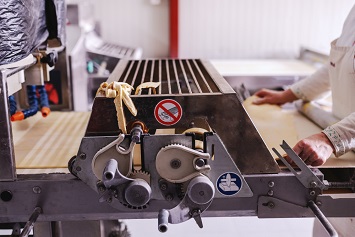California’s Division of Occupational Safety and Health (Cal/OSHA) cited a food manufacturer and staffing agency, seeking over $300,000 in penalties, for lockout/tagout and other violations after a temporary worker lost two fingers cleaning dough-rolling machinery.
Neither employer trained the worker to follow lockout/tagout procedures before cleaning machinery.
The agency fined JSL Foods, Inc., $276,435 for seven violations, including:
- One willful repeat serious violation, and
- One willful repeat serious accident-related violation for failing to follow lockout/tagout procedures.
Priority Workforce was fined $29,250 for failing to develop, implement, and maintain an injury and illness prevention program. Cal/OSHA also cited the Tustin, California-based staffing agency for failure to ensure employees were effectively trained and for failure to ensure the machinery was adequately guarded.
Machinery Not Locked or Tagged Out
An employee of staffing agency Priority Workforce, Inc., was assigned to work at a Los Angeles food manufacturing facility owned by JSL Foods, Inc., a maker and distributer of baked goods, noodles, and pasta. On October 2, 2018, the worker was cleaning a dough-rolling machine when his left hand was partially pulled into the moving rollers and two of his fingers were amputated.
Cal/OSHA investigators found the machine had neither been adequately guarded to prevent fingers from entering pinch points nor de-energized and locked out to prevent the movement of machine parts while the worker was cleaning it.
Lockout prevents the movement of machine parts by isolating a machine from its power source and using a device to prevent machinery from being restarted. A tagout device informs workers that operating a tagged machine is prohibited.

JSL Cited Twice in 2015
Cal/OSHA cited JSL Foods for willful, repeat serious and willful, repeat serious accident-related violations because the agency cited JSL twice for the same violations in 2015.
The state agency characterizes safety violations as:
- “Serious” when there is a realistic possibility that death or serious harm can occur as a result of the cited condition;
- “Accident-related” when the cited violation causes a fatality, illness, or injury; and
- “Willful” when the employer is aware of the law and still violates it or is aware of a hazardous working condition and takes no reasonable steps to address the hazard.
“Lockout/tagout procedures are required to protect employees who maintain powered equipment with moveable parts,” Cal/OSHA Chief Juliann Sum said in a statement.
Proper Lockout/Tagout Procedures
Cal/OSHA cautions food processing workers who adjust, clean, repair, or unjam machinery to never reach into moving machinery or remove machine guarding. The agency also has outlined steps to follow in lockout/tagout procedures, including:
- Shutting off machine power by shutting off the control, electrical power switch, power disconnect, or by pulling out the plug from a socket if the machine has a cord and plug;
- Securing the machine by locking the power disconnect in the off position and tagging it, then testing to make sure all power and energy are off before opening or removing machine guarding;
- Cleaning, clearing, or unjamming the machinery; then
- Replacing the machine guarding and making sure everyone is clear of the machine before restarting it.
Cal/OSHA 2019
To learn more about Cal/OSHA enforcement trends and strategies to stay in compliance, attend BLR’s upcoming Cal/OSHA Summit 2019.
The Cal/OSHA Summit, which will be held from October 7–9 in Los Angeles, is a leading state-specific event for California employers and safety professionals to get cutting-edge developments on new safety regulations, compliance strategies, and management tactics. Register now.


